
Satureja is a genus of aromatic plants of the family Lamiaceae, related to rosemary and thyme. It is native to North Africa, southern and southeastern Europe, the Middle East, and Central Asia. A few New World species were formerly included in Satureja, but they have all been moved to other genera. Several species are cultivated as culinary herbs called savory, and they have become established in the wild in a few places.

Onopordum, or cottonthistle, is a genus of plants in the tribe Cardueae within the family Asteraceae. They are native to southern Europe, northern Africa, the Canary Islands, the Caucasus, and southwest and central Asia. They grow on disturbed land, roadsides, arable land and pastures.

Gagea is a large genus of spring flowers in the lily family. It is found primarily in Eurasia with a few species extending into North Africa and one species in North America.
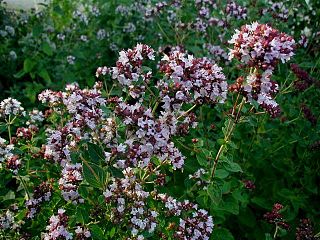
Origanum is a genus of herbaceous perennials and subshrubs in the family Lamiaceae, native to Europe, North Africa, and much of temperate Asia, where they are found in open or mountainous habitats. A few species also naturalized in scattered locations in North America and other regions.

Ballota (horehound) is a genus of flowering evergreen perennial plants and subshrubs in the family Lamiaceae. native to temperate regions. The Mediterranean region has the highest diversity in the genus, with more isolated locations in South Africa, Central Asia, northern Europe, and the islands of the eastern North Atlantic. It is found in rocky and waste ground.
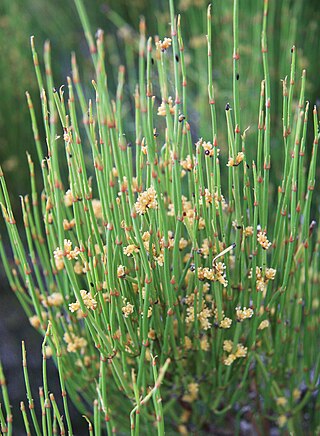
Ephedra is a genus of gymnosperm shrubs. The various species of Ephedra are widespread in many arid regions of the world, ranging across southwestern North America, southern Europe, northern Africa, southwest and central Asia, northern China and western South America. It is the only extant genus in its family, Ephedraceae, and order, Ephedrales, and one of the three living members of the division Gnetophyta alongside Gnetum and Welwitschia.

Senecio leucanthemifolius is a plant common in sea-side in Mediterranean area.

Chiliadenus is a genus of flowering plants in the family Asteraceae.

Pterocarpans are derivatives of isoflavonoids found in the family Fabaceae. It is a group of compounds which can be described as benzo-pyrano-furano-benzenes which can be formed by coupling of the B ring to the 4-one position.

Bituminaria bituminosa, the Arabian pea or pitch trefoil, is a perennial Mediterranean herb species in the genus Bituminaria.
Bituminaria morisiana is a perennial Mediterranean herb species in the genus Bituminaria. Leaf, trifoliate with 3 linear, lanceolate, tomentose leaflets. White flowers in globose flowerheads. Fruit a tomentose legume. Flowers May–July. It is endemic to Sardinia where it is restricted to high mountain areas, such as Monte Albo and Monte Corrasi.
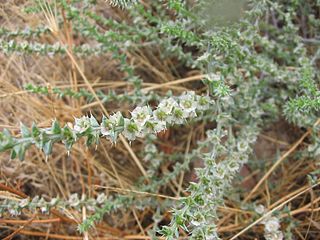
Kali is a genus of plants in the subfamily Salsoloideae in the family Amaranthaceae. Common names of various members of this genus include buckbush, rolypoly, tumbleweed for its wind-blown seed dispersal habit, and Tartar thistle and Russian thistle for its origins.
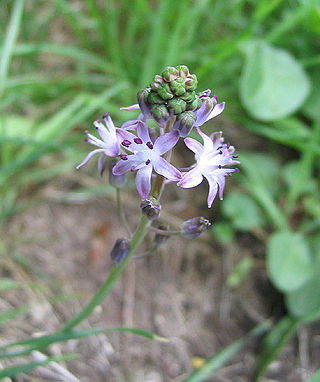
Prospero is a genus of bulbous flowering plants in the family Asparagaceae, subfamily Scilloideae. It is distributed in Europe, around the Mediterranean, and through the Middle East to the Caucasus.
Salvatore Brullo is professor at University of Catania since 1980 teaching Systematic Botany, he obtained a degree in natural science on July 1970. For six years he was Director of the Department of Botany, at the University of Catania.

Thymbra, common name Mediterranean thyme, is a genus of plants in the family Lamiaceae. As currently categorized, the genus has seven species and one subspecies. It is native to the Mediterranean region of southern Europe, North Africa, and the Middle East.
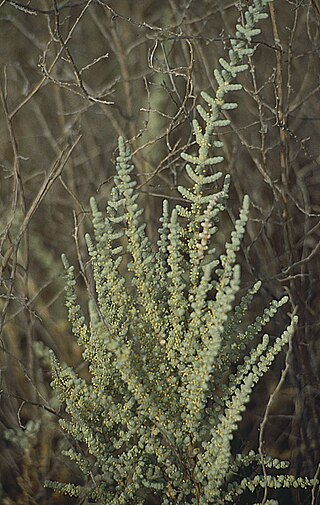
Halocnemum is a genus of halophytic shrubs in the family Amaranthaceae. The plants are fleshy and apparently articulated with characteristic globular or short-cylindrical lateral branches, and reduced leaves and flowers. There are two species, occurring from Southern Europe and North Africa to Asia.
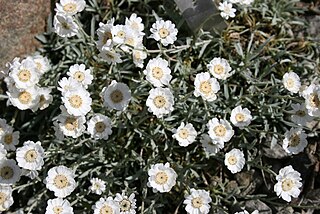
Achillea cretica, Cretan yarrow, is a species of flowering plant in the family Asteraceae, native to Greece, the East Aegean Islands, Crete, Turkey, and Cyprus. It is typically found in calcareous rocky areas such as cliffs, gorges, scree fields, and even ancient ruins, and is somewhat tolerant of salty conditions.

Kartalinia acaulis is a species of flowering plant in the legume family, Fabaceae. It is the sole species in genus Kartalinia. It is a perennial native to Turkey and the Caucasus.
















